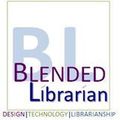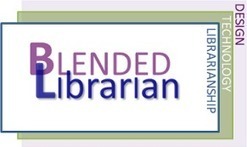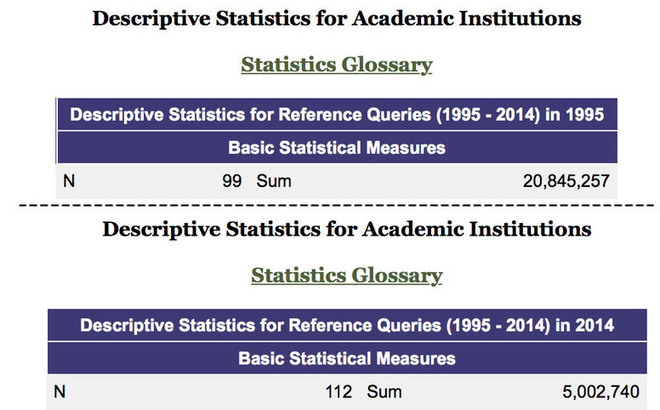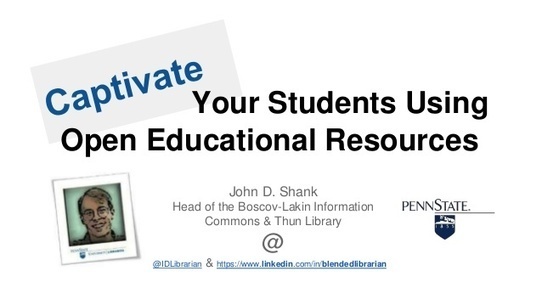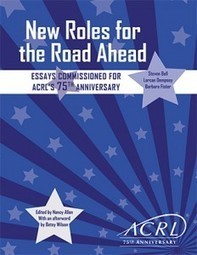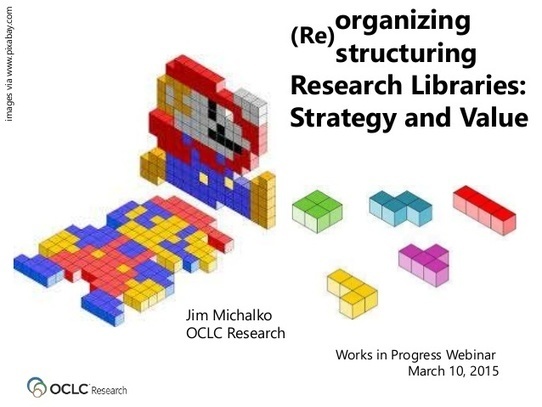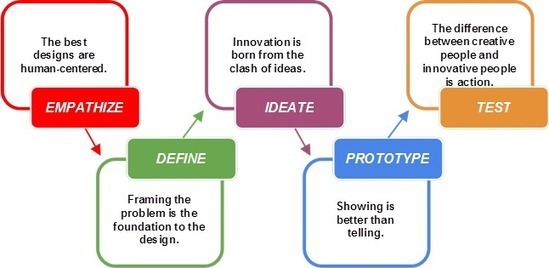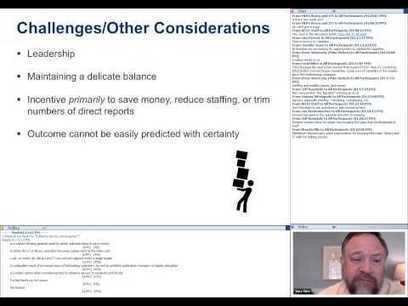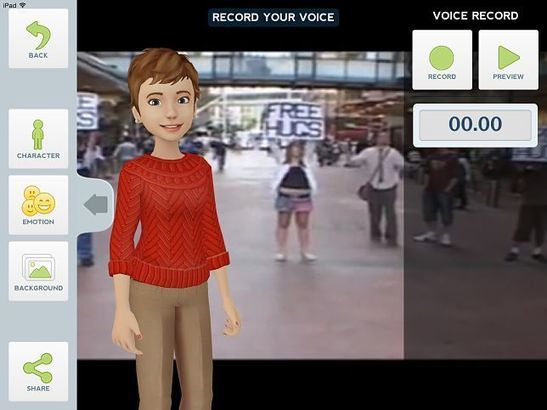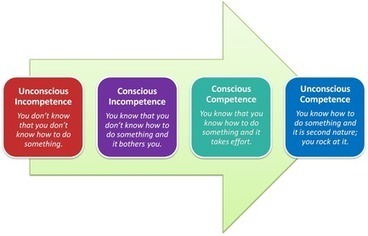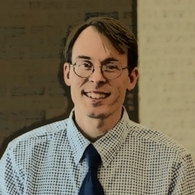This is a great Seth Godin quote. Technology enables more connections than ever. Those connections allow us to learn and create. If you are interested in learning more about the connections between design, technology, & libraries join the Blended Librarians Online Learning Community.
Get Started for FREE
Sign up with Facebook Sign up with X
I don't have a Facebook or a X account
|
No comment yet.
Sign up to comment
June 23, 2015
Libraries @ the intersection of innovation... #libraries #ACRL #BLibrarians #education #highered
John Shank
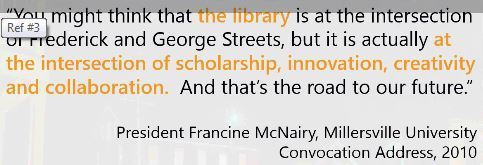
Quote from 2015 PALCI Annual Meeting Highlights Webinar.
John Shank:
I wish every president, provost, dean or chancellor had this perspective on the future of the academic libraries. Blended librarians believe in innovation, creativity, and collaboration by design. June 9, 2015
Becoming Open Ed. Leaders | Webcast Recording #edtech #education #highered #libraries #acrl
John Shank
Recorded on Thursday, May 28, 2015 this webcast presentation and discussion with Quill West speaks to the importance of academic librarians fostering an institutional culture that embraces open education as their institutions recognize that textbook costs create a significant barrier to students’ access to education. Librarians in Washington State are taking a leadership role in college-wide efforts to adopt alternatives to textbooks by engaging in a Library Services Technology Act (LSTA) Grant administered by the Washington State Library/Office of the Secretary of State. May 29, 2015
The Evolving & Expanding Service Landscape Across Academic Libraries #ala #acrl #highered #libraries
John Shank

Helen Lynch's curator insight,
September 12, 2015 3:46 PM
Reference transaction stats declining but "pop-up"and other services growing
May 14, 2015
Becoming Open Education Leaders Webinar #edtech #OER #openaccess #highered #education #elearning #acrl
John Shank
Join the Blended Librarians Online Learning Community on Thursday, May 28 at 3:00 pm EDT for a free webcast presentation and discussion with Quill West, an open education advocate, librarian, and educator from Washington State. Currently Quill is the Open Education Project Manager at Pierce College. In her webcast, West will speak to the importance of academic librarians fostering an institutional culture that embraces open education as their institutions recognize that textbook costs create a significant barrier to students’ access to education. Librarians in Washington State are taking a leadership role in college-wide efforts to adopt alternatives to textbooks by engaging in a Library Services Technology Act (LSTA) Grant administered by the Washington State Library/Office of the Secretary of State. In the effort to be open education leader, West and colleagues have created a course for librarians on how to serve open education needs. The webcast will address the open education skills that librarians are developing in order to better serve the open education needs of our institutions. May 15, 2015
7 Things You Should Know About Developments in ID @educause #edtech #highered #designthinking #education
John Shank
John Shank:
Good quick summary overview of the current state of ID in Higher Ed. April 29, 2015
Captivate your students using Open Educational Resources (OERs) #edtech #OERs #elearning #highered #education
John Shank
Your Students Using Open Educational Resources John D. Shank Head of the Boscov-Lakin Information Commons & Thun Library @ @IDLibrarian & https://www.l…
John Shank:
The slides from my recent seminar @ BCC - Enjoy! April 20, 2015
2020: Envisioning Higher Education & the Library... webcast now available #edtech #highered #ACRL #education
John Shank
This forward looking webcast examines the trends and emerging technologies that will impact higher education & academic libraries in the year 2020. Our panelists share their vision of what colleges & universities along with their libraries will look like as well as the trends they will have responded to in order to remain competitive in the new environment. April 2, 2015
2015 ACRL Environmental Scan #ACRL @ALA_ACRL #acrl2015 @ACRL2015 #edtech #edchat #libraries
John Shank
Every two years, the ACRL Research Planning and Review Committee releases an environmental scan of higher education, including developments with the potential for continuing impact on academic libraries. The 2015 environmental scan provides a broad review of the current higher education landscape, with special focus on the state of academic and research libraries. The document builds on earlier ACRL reports, including the Top Trends in Academic Libraries. The 2015 environmental scan is freely available on the ACRL website (PDF). The beginning of the year brings many “top” lists for what to look for in 2015. So far there’s not much predicting for what looks big for the academic library world. Here’s a shot at it. March 26, 2015
Cultivating Campus Collaborations #ala #acrl @ALA_ACRL #education #highered #acrl2015
John Shank
ACRL Discussion Series Webinar for Instruction Coordinators, 6 March 2015.
John Shank:
Great presentation about the efforts at the Claremont Colleges. Here is a link to the recorded presentation https://ala.adobeconnect.com/_a1087453682/p3asujae6d4/?launcher=false&fcsContent=true&pbMode=normal March 30, 2015
The Road to 2020: Envisioning Higher Education & the Library... BL Webcast #edtech #highered #education #ACRL @GdnHigherEd @Edudemic @ALA_ACRL
John Shank
This forward looking webcast will examine the trends and emerging technologies that will impact higher education & academic libraries in the year 2020. Our panelists will share their vision of what colleges & universities along with their libraries will look like as well as the trends they will have responded to in order to remain competitive in the new environment.
John Shank:
Join the Blended Librarians Online Learning Community this Thursday, April 2, 2015 at 3:00 pm EST for a webcast presentation and discussion on what trends will be impacting Higher Ed. & Libraries in 2020. To learn more and register for this free event visit: http://goo.gl/7M1Ekx
March 12, 2015
Reorganizing Restructuring Research Libraries: Strategy and Value #ARL #ACRL #ALA #libraries
John Shank
Presented as an OCLC Research Webinar 10 March 2015 "Live as if you were to die tomorrow. Learn as if you were to live forever.” ― Mahatma Gandhi 
Julie Price's curator insight,
February 20, 2015 10:41 PM
What a great quote. Pass it on to your kids when they set off to school! 
Alfredo Corell's curator insight,
March 8, 2015 3:35 PM
If you have worked in any educational environment from elementary school, higher education, or corporate training, then you have had students who consistently struggle with a topic, skill, or prerequisite knowledge that they must learn in order to be successful. Likewise, many of those same students struggle to motivate themselves to learn the material they are struggling with.
February 13, 2015
Choosing & Using Assessment Management Systems #edtech #acrl #ala #elearning #highered
John Shank
John Shank:
Assessment & Evaluation are critical for any design process. AMS will become standard across universities in the next couple of years. February 9, 2015
A Typology of Web 2.0 Learning Technologies | @educause #edtech #elearning #highered #acrl #infolit
John Shank
John Shank:
A good, comprehensive list of web 2.0 tech that all blended librarians should know. #edtech #elearning #highered #acrl #infolit "Design thinking focuses on users and their needs, encourages brainstorming and prototyping, and rewards out-of-the-box thinking that takes "wild ideas" and transforms them into real-world solutions." 
vgpascal's curator insight,
January 29, 2015 1:32 AM
Pour la formation professionnelle également :-) 
Shiban Kak's curator insight,
February 2, 2015 3:43 AM
Design should be the basis of Engineering education and bringing in the design focus makes the students understand what problem solving is, what knowledge application within the bounds of constraints is and finally what is meant by the trade off to make an optimal decision. Many of us in the technical education must use the science and philosophy of design to make students learn what engineering is about. Engineers must be creative and generate products & services that benefits humanity and makes life more enjoyable for all but not at the cost of environment as that places the burden of my today's solution on the children's of tomorrow. Recorded on March 18, 2014. This video is licensed under the Creative Commons Attribution-Sharealike 4.0 License, the terms of which are available here: http... A shiny new Instructional Design Librarian at California State University shared her story about being a new ID librarian. December 12, 2014
Kathy Schrock: 6 Apps That Target Higher-Order Thinking Skills -- THE Journal
John Shank
A higher-order thinker is a critical thinker. What are the attributes of a critical thinker? In The Miniature Guide to Critical Thinking Concepts and Tools, Richard Paul and Linda Elder describe a well-cultivated critical thinker as someone who:
Nancy Jones's curator insight,
May 25, 2015 11:06 AM
I like the breakdown presented in this article as well as the emphasis on using apps as critical thinking tools, not just creation tools. 
Ness Crouch's curator insight,
March 13, 2016 3:08 AM
Kathy Schrock has been looking ahead with technology and a librarian's instinct for organization for years. She's still hitting it out of the park. From Novice to Master… As we learn and develop mastery of a skill, our level of expertise grows and changes with our ability to know when and how to use that knowledge. In the book How Learning...
John Shank:
This concept has very real implications for how students and faculty alike view information literacy skills and knowledge. #ALA #ALA_ACRL #infolit #blendedlibrarian 
Tony Meehan's curator insight,
November 27, 2014 3:03 PM
This model describes 4 levels of mastery using measurements of competence and consciousness. As novices, we are in a state of “Unconscious Incompetence”, where we don’t recognize what we need to know. As we gain knowledge and experience, we transition to “Conscious Incompetence,” where we are aware of what we do not know. Developing further, the third stage is “Conscious Competence,” where most of us remain. We have considerable ability and knowledge at our craft, yet it is not automatic; we must still think and act deliberately. The fourth and final stage is mastery, or “Unconscious Competence”. |


